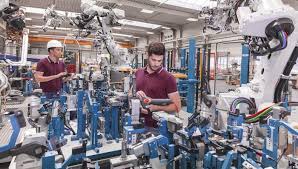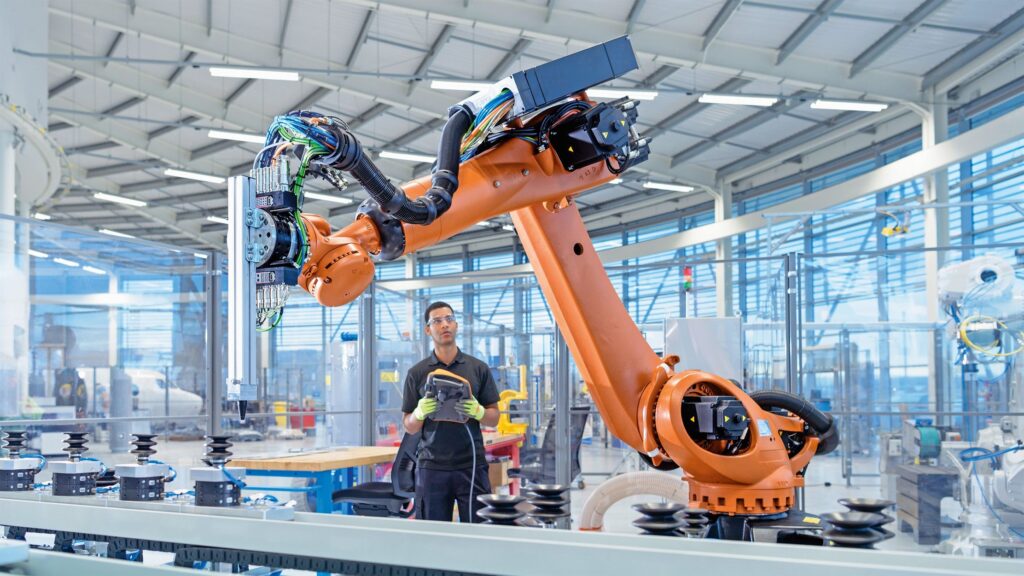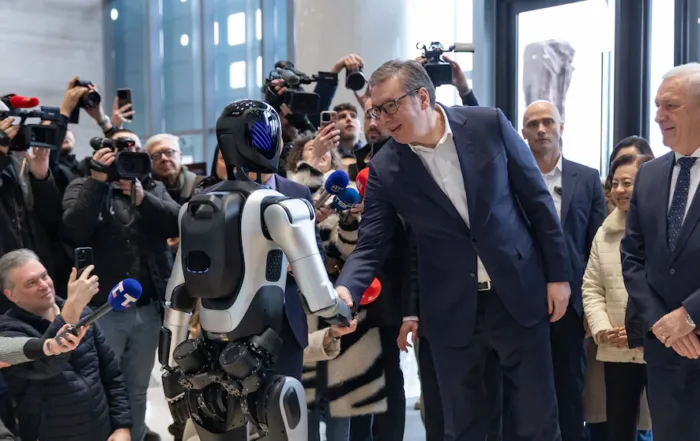The Ascent of Autonomous Intelligence
The Ascent of Autonomous Intelligence

The Robots – An Epoch of Transformative Opportunities for Entrepreneurship
The annals of technological innovation chronicle a continuous progression, periodically redefining the very foundations of our civilization. A particularly significant milestone in this epoch of development materialized in 1954 when the visionary George Devol conceived the first programmable industrial robot and subsequently sold it to the esteemed General Motors Corporation. This act marked the inception of a profound transformation within the manufacturing landscape.
Today, robotics has burgeoned into a global economic sector of immense scale. Analysts at Goldman Sachs project the global market for humanoid robots to reach an impressive valuation of $38 billion USD by the year 2035. Meanwhile, the renowned entrepreneur Elon Musk anticipates an ultimate market potential of an estimated $10 trillion USD. His rationale, it must be noted, possesses a remarkable simplicity and prescience: “Everyone will need them, much like automobiles or mobile telephones, and the potential market volume will be simply enormous.”
A multitude of prominent enterprises, including the innovation leaders Tesla and Boston Dynamics, as well as the ascendant Qihan Technology, are deeply engaged in the field of robotics. Concurrently, ambitious start-ups such as Agility Robotics and Promobot are entering the market with novel approaches and appear to be instigating substantive change. The impression is increasingly solidified that we are inexorably approaching a reality wherein billions of robots worldwide will significantly shape both private households and industrial production facilities.
However, does this evolution primarily constitute a source of apprehension, ranging from potential job displacement to complex ethical quandaries within the context of automation? Or does it not rather unlock an unprecedented spectrum of opportunities for individuals possessing an entrepreneurial mindset?
The Auspicious Horizons of Robotics Manufacturing
The robotics industry undoubtedly stands on the cusp of a phase of exponential growth. We are no longer speaking solely of the traditional industrial robots that perform monotonous tasks along rigid assembly lines. Rather, we envision fully autonomous, humanoid machines endowed with intricate decision-making capabilities and a remarkable degree of physical dexterity. The future perspective is delineated with a clear contour: robots could, in the foreseeable future, attain a ubiquity akin to modern smartphones, seamlessly integrating into our daily lives to undertake repetitive manual tasks, demanding household chores, direct customer service, and even sensitive caregiving responsibilities.
To analyze the ensuing entrepreneurial opportunities with rigor, it appears initially imperative to illuminate the fundamental aspects of robot development. For actors seeking to enter this dynamic market, diverse fields of activity unfold along the value chain:
-
Hardware Development: From highly sophisticated sensory systems enabling precise environmental perception to energy-efficient actuators ensuring fluid and powerful movements, significant innovation potentials exist in the development of the physical components that fundamentally determine the performance of humanoid robots. Miniaturization, robustness, and cost-effectiveness of these components represent pivotal challenges and, consequently, attractive domains for engagement.
-
AI and Software Development: The “brain” of any robot is its artificial intelligence. To navigate autonomously within a complex world, interact naturally with humans, and continuously learn from its experiences, robots necessitate cutting-edge algorithms and highly evolved software architectures. Domains such as machine learning, computer vision, natural language processing, and path planning are of crucial importance here, offering a vast field for specialized developers and innovative software solutions.
-
Energy Solutions: The autonomy and mobile deployment of robots are inextricably linked to the availability of high-performance and long-lasting energy storage. The development of batteries with increased energy density, shorter charging times, and enhanced safety, as well as the exploration of sustainable energy sources such as fuel cells, will be decisive in realizing the economically viable deployment of robots on a large scale.
-
Maintenance and Repair: Analogous to the evolution of the automotive industry and the concomitant demand for qualified automotive mechanics, a comprehensive network of specialized robot service providers will become indispensable with the increasing proliferation of robots. The maintenance of complex mechanical and electronic systems, the diagnosis and rectification of malfunctions, as well as the execution of repairs, require specific expertise and thus offer an attractive business sector.
The Subtly Veiled Opportunities Beyond Pure Robot Production
The inexorable rise of robots undoubtedly raises significant questions – from the potential repercussions on the labor market to the intricate ethical dilemmas associated with increasing autonomization. However, the history of technological evolution teaches us that groundbreaking advancements, while transforming or even rendering obsolete established industries, simultaneously spawn entirely new sectors and their associated entrepreneurial opportunities. Entrepreneurs who possess the acuity to look beyond initial anxieties and focus on the imperative of adaptation and innovation will undoubtedly benefit from this impending robotics revolution.
The actual manufacturing of robots may, for most small and medium-sized enterprises – at least in the current phase – present a formidable hurdle demanding substantial capital investment and specialized expertise. However, it is reasonable to anticipate the development of a multitude of complementary secondary markets that will unlock a broad spectrum of attractive entrepreneurial opportunities.
Let us first consider those domains that do not primarily aim at the creation of physical robots:
-
Ethical AI Governance: With the progressive integration of autonomous systems into an ever-increasing number of life domains, ensuring the responsible handling of artificial intelligence and adherence to relevant regulatory frameworks is gaining paramount importance. Companies specializing in the areas of AI auditing, the development of ethical guidelines, and comprehensive AI ethics consulting will experience high demand in the future. Both corporations and governmental institutions will increasingly seek expertise to navigate the complex legal and moral landscape of autonomous systems with confidence and responsibility.
-
Robot Training and Customization: The ability to efficiently train robots and adapt them to specific tasks will be a crucial competitive differentiator. Companies offering personalized software solutions or innovative behavioral models for robots will flourish. With increasing automation across diverse industries, the demand for robots precisely tailored to specific requirements – from sophisticated tasks in customer service to sensitive support in medical care – will rise. Companies specializing in adaptive learning algorithms and user-friendly programming interfaces will secure a significant competitive advantage.
-
Integration Services: The seamless integration of robots into existing business processes and private households presents a complex challenge. Companies offering comprehensive consulting and integration services will therefore be in high demand. Many organizations require professional support in selecting the optimal robot solutions, their smooth implementation into workflows, and subsequent optimization for maximum efficiency. Service providers offering comprehensive training, rapid troubleshooting, and continuous technical support will establish themselves as indispensable partners in the adoption of automation.
-
Cybersecurity for Robots: The protection of autonomous machines from cyberattacks and potential misuse will become a critical necessity with their increasing proliferation. As robots process sensitive data and execute critical operations, cyber threats pose significant risks to both businesses and individuals. Companies specializing in the development and implementation of robust security solutions – from encrypted communication and advanced intrusion detection to AI-based security analytics – will encounter enormous growth opportunities in this vital future domain.
-
Educational Platforms: Interest in robotics and its associated technologies is steadily growing. Entrepreneurs can capitalize on this trend by developing innovative learning platforms and interactive educational materials. Interactive robot kits for early engagement, comprehensive programming courses, and immersive virtual reality-based learning programs can foster an understanding of robotics in a playful and effective manner, cultivating a new generation of robotics experts.
-
Consulting in Robotic Process Automation (RPA): In the face of increasing competitive pressure, companies are continuously seeking opportunities to enhance efficiency and reduce costs. Robotic Process Automation (RPA) offers immense potential in this regard by automating repetitive and rule-based tasks within digital systems. Entrepreneurs can offer valuable consulting services to companies to identify suitable automation potentials and implement tailored RPA solutions that lead to significant efficiency gains.

Let us now also consider the business opportunities for entrepreneurs who contemplate the production of robots themselves. While some of these areas demand substantial initial investment, niche markets certainly exist where innovative and specialized providers can establish themselves successfully:
-
Cost-Effective Robotics: For many small and medium-sized enterprises, the currently available, highly advanced robot systems represent a prohibitive investment. Entrepreneurs can bridge this market gap by developing cost-efficient and flexibly adaptable robot platforms specifically tailored to the needs of smaller businesses. These could include intelligent inventory robots for warehouse management processes, autonomous cleaning robots for commercial spaces, or interactive customer service robots for the retail sector.
-
Agricultural Robotics: Given the growing global population and the imperative for more sustainable farming methods, the demand for efficient and environmentally friendly agricultural technologies is increasing. Entrepreneurs and innovative businesspeople can leverage the immense potential of agricultural robotics by developing, for instance, autonomous drones for the precise application of fertilizers and pesticides, self-driving tractors for field cultivation, or autonomous harvesters for the efficient gathering of crops. These technologies can contribute to maximizing crop yields, minimizing resource waste, and promoting sustainable agricultural practices.
-
Medical Robotics: The healthcare sector is in a state of continuous evolution, and medical robotics offers excellent business opportunities for visionary entrepreneurs. Advancements in surgical robotics, robotic rehabilitation support, and telemedicine can significantly improve patient care and optimize medical procedures. The development of precise surgical robots, intelligent prosthetics, and robotic systems for the remote monitoring of patients opens up a broad field for innovation.
-
Construction Robotics: The construction industry, traditionally more hesitant in adopting new technologies, is poised for comprehensive automation. Entrepreneurs could focus here on developing robotic solutions for repetitive and physically demanding tasks such as bricklaying, the precise execution of surveying work, or the autonomous inspection of construction sites. The deployment of construction robots promises an increase in efficiency, a reduction in labor costs, and a significant enhancement of workplace safety on construction sites.
-
Robotics in Elder Care: In light of global demographic trends and the steadily increasing number of elderly individuals, the demand for innovative solutions in elder care is continuously rising. Entrepreneurs can consider the development of robotic companions that support elderly individuals in their daily lives, intelligent assistive devices for greater independence, or autonomous robots for health monitoring and emergency assistance.
Entrepreneurs and the Shaping of the Future Robotics Era
The projections from Goldman Sachs, anticipating the shipment of 250,000 humanoid robot units for industrial use within the next five years and annual sales of approximately one million units to private consumers in ten years, underscore the inexorable momentum of this development. The robots are coming – of this there is little doubt. However, whether this evolution primarily displaces existing industries or rather unlocks an immense reservoir of new opportunities for innovative business models will depend significantly on our capacity for adaptation and our entrepreneurial foresight.
History teaches us that every significant technological upheaval – from the Industrial Revolution to the rise of the internet – brought with it both disruptive changes and enormous potential for new value chains. As we have seen, a broad spectrum of opportunities exists to position oneself within this nascent market – from the development of ethical AI governance frameworks to tailored services and innovative cybersecurity solutions, and even the specialized niche manufacturing of robots. Entrepreneurs who perceive robotics not as a threat but rather as fertile ground for the emergence of new business sectors will ultimately be best equipped to benefit from and actively shape this next great economic transformation.
We’ve helped hundreds of people move their businesses overseas, legally reduce their taxes, and become dual citizens. We are focused on high-net-worth individuals and their families as well as corporations wishing to invest their offshore companies or even secure their wealth in offshore financial centers around the world. We will help you to find the best solution for setting up an offshore or onshore company. Another special area of our full-service consulting is the investment opportunity and solution in Europe, especially in the Balkans, Africa, Asia, UAE, the Caribbean and the Pacific.
If you are looking for it, please feel free to contact us. We create a holistic plan that serves your purpose.
The TCME Group Worldwide as well its partner in Vanuatu are accredited, licensed and authorized agents and facilitators of the Government of Vanuatu for the citizenship programs of the VDSP and the CIIP in Vanuatu.
GCI UNIT Worldwide by TCME Worldwide Group, designs and implements customized, holistic strategies for successful investors and entrepreneurs to legally reduce their tax bills, diversify and protect their wealth, invest abroad, gain a second citizenship and live a freer life worldwide to lead.
YOUR CHANCE FOR A BETTER LIVE
TCME Worldwide Group firm is a leading professional International Business Investment and Advisory Firm for Foreign Economic Relations. Our range of services includes:
Offshore and Onshore Company Formation,
international Business & Management
Citizenship & Residency (Advice on residency and citizenship by investment programs, VIP citizenship programs in cooperation with more than 70 countries)
Investments & Corporate Financing
Advisory for Foreign Economic Relationship
Diplomatic Consultancy & Public Affairs
If you would like to discuss your internationalization and diversification plans, book a consulting session* or email us under: [email protected]
*A counseling session is a conversation about your portfolio and goals. It does not constitute legal, financial, tax or investment advice.
TCME Worldwide Group – Global Investments –
Level 33, Ilham Tower, 8 Jalan Binjai,
Kuala Lumpur 50450, Malaysia
www.tcme.company
www.citizenship-news.com
International Phone: +66 99091 8357 (also for BOTIM, Signal, Viber, Telegram)
Malaysia Phone: +603 2169 7057
Montenegro Phone: +382 69 150 130 (WhatsApp)
Telegram https://t.me/passport_Vanuatu
Telegram https://t.me/passport_news





